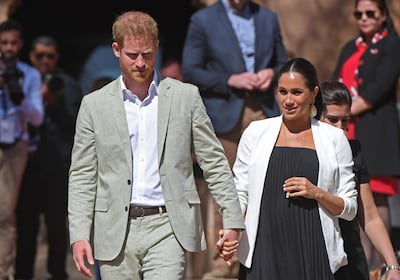Just like the Duchess of Sussex, I’m American by birth, but had my first child in London. There, sadly, the similarities end.
She’ll have her baby at some venue too fancy to be announced; I had mine in the East London hospital of Homerton, known for its expertise in treating gunshot wounds.
But there are some constants about the British child-rearing experience that will astound all Americans, and in the spirit of sisterly friendship, here you go, Duchess:
1. The doctors
The American love for authority figures extends to our worship for doctors, but British people feel deep, crippling embarrassment at even the thought of bringing their child in to their local GP. This is, unfortunately, shared by the medical staff themselves, who seem to allay their self-doubt by infantilising medical terminology. When my daughter had jaundice after birth, I was told she had a “case of the yellow” and to lie her in front of a window. (At the other end of the spectrum, when my second daughter had jaundice, in Dubai, they put her in the Neonatal Intensive Care Unit her for a day. They’re both fine; I’m still scarred.)
On the bright side, midwives will actually visit you at home in the UK so you don't have to take your weak self into public in the weeks after having a baby; that's a little gift from NHS heaven right here.
2. The NCT

Because British women have longer maternity leaves (9 months to a year), a whole social culture around the first months of baby-rearing has developed. Central to this is the National Childbirth Trust (NCT) an organisation that was established in the 1950s to give women more control over how they give birth, and is now effectively a social network for new mothers who want to consume cake.
You pay money, put in your postcode and your due date, and hey presto, you have new best friends. Even if you don’t join NCT yourself (and I can’t imagine how big the catchment area is around Frogmore Cottage), you won’t be able to avoid the long arm of the organisation. Practice this as a start to every sentence: “A woman from my NCT group said…”
3. The humble-brag
This technique allows you to talk about how great your child is (ie, fulfilling your American wont) while still conforming to British societal needs. Example: “My little Charlie is going to be such a failure on the sports field! He’s walking at 10 months, but he keeps falling over!” Horrendous. Ignore.
4. Self-deprecation
Similar, but with a slight difference: talking (sincerely) about what a terrible job you are doing. This is therapy in the guise of social lubricant.
“I tried for two hours to get Isabella down for a nap and then ended up falling asleep on a pile of dirty laundry, and when I woke up she was mainlining detergent pellets with the local pit bull!” No other country does self-deprecation like the British, because – not so surprising in this Brexit era – they’re essentially shambolic.
5. Mumsnet
This is an internet messaging board where British mothers trade little bits of knowledge, such as whether “Sophia” is an overused name (it is), whether reusable nappies are a total pain (they are), and what to do if your child swallows Lego (get off the internet and go to the hospital).
The trick is to speak its language: they’ve invented a whole lexicon so they can complain about their family members while still pretending to like them. (Ah, the British.)
For example: Harry, Prince of Wales would be your DH (“darling husband”). Your children would be DS (“darling son”) or DD (“darling daughter”), or if you have two, then DD2. Here’s also where you can get information on some of the most controversial new practices, BLW (baby-led weaning, where your Magimix breaks and you refuse to get a new one) and CC (controlled crying, where you sob quietly while listening to your baby sob loudly).
6. British dads are gung ho

Unlike men in America, struggling under the yoke of toxic masculinity, men in the UK are keen to prove their parenting chops at every opportunity. They’ll don the baby sling, push the pram, mash the boiled carrots. Because so much of first-time parenting takes place in the pub – in a strange mix of the parents’ creaky transition from non-parenting existence and the fact that few British social occasions can take place elsewhere – you’ll often find new dads trading war stories of parenting, mostly to do with poop, which they seem to be delighted is back on the table as a conversation topic.
7. Explanations
This is an outgrowth of the British proclivity to use 10 words when two is just fine. Say what you like about Americans, we don't beat around the bush.
British people always need to tell their kids why they’re asking them to do something, like they’re liveblogging their decision-making process.
This is the actual Supernanny’s advice for kids who don’t want to get out of bed: “You don’t like me coming into your room in the morning because you're tired and don’t feel like talking, so instead, you’re going to set an alarm clock and I’m going to leave you to get up without nagging you”. Here’s how we say it in American: “Get. Out. Of. Bed.”
Meghan, the media's not going to like you whatever you do – you might as well save your breath and bark your orders.


